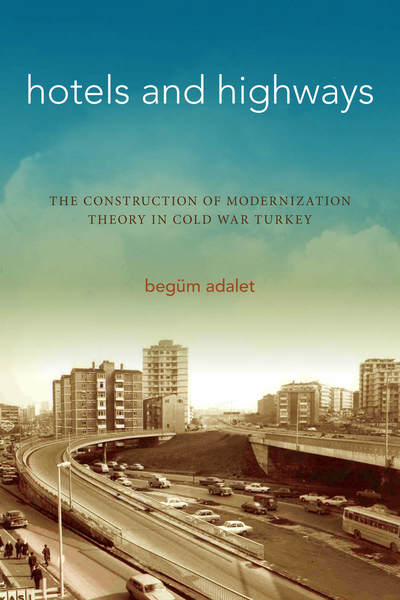
Hotels and Highways: The Construction of Modernization Theory in Cold War Turkey by Begüm Adalet

Begüm Adalet’s Hotels and Highways: The Construction of Modernization Theory in Cold War Turkey is an exciting and innovative study of the American involvement in Turkey in the beginning of the Cold War. By exploring the US-led modernization debates and projects in Turkey in the early 1950s,Hotels and Highwaysexplains why Turkey’s siding with the Western bloc in the Cold War was deeply related to its political economy and the then-new “development” chapter of the Turkish nation-state project. However, the audience of this book will exceed those interested in the history of modern Turkey and the implications of the US involvement in its domestic politics. Hotels and Highwaysis also an exceptional guide for scholars and students interested in political science methods, modernization theory, Cold War American Imperialism (especially in the Middle East), political geography, and anthropology of tourism.
Adalet’s book focuses on two key aspects of the modernization paradigm: the creation of the infrastructure to cultivate modern selves in a society, and the actual process of cultivating these modern selves. Hotels and Highways’multiple chapters explain these two interrelated processes in depth while including groundbreaking analysis on the resistance to these processes. According to Adalet, the international and domestic political climate rendered Turkey convenient to be simultaneously a modernization theory laboratory and the object of the very theory US-based political scientists were developing. As the US was leading its aid program with the intention to disperse “development” around the world, Turkey, with a political elite and political commitment to “modernization,” became a natural “model ally” to the American hegemony. According to Wolfgang Sachs, “[…] development is much more than just a socio-economic endeavour; it is a perspective which models reality, a myth which comforts societies” (xvi).[1]Adalet’s book shows that when the development myth hailed from across the Atlantic, it also faced resistance from the very subjects—technocrats, academics, and engineers, and architects— who were to transform Turkey and participate in this new modernization paradigm.
The reconfiguration of political science as a “scientific” field in the Cold War era, which tried to distance itself from racial and imperialist undertones of social sciences and to acquire a more universalist outcome, required new paradigms and mechanisms of production of knowledge. In this intellectual context, Hotel and Highways shows that the works of Dankwart Rustow and Daniel Lerner—two US-based political scientists— in and on Turkey were aimed to assign this country, and not another one in the so-called developing world, the role of laboratory for the modernization theory. Developing this theory applicable to various contexts while the American imperialism was expanding was crucial to the new mission of the discipline, although in the long run, Dankwart Rustow’s intellectual interactions, with his colleagues in America and Turkey derailed his commitment to developing a universalist modernization theory which could be applied elsewhere. Regardless, modernization was thought to be a cultivation of self, which could be assessed—and even carried out—in Turkey at interviews and surveys by political scientists. Following Daniel Lerner’s quest to utilize survey to test the modernization theory, Adalet’s book, in fact, unearths how the survey methodology resulted in erasing material and historical conditions from the assessments of the modernization paradigm in Turkey. Adalet’s work on these two political scientists shows that while Turkey as a Modernization theory laboratory was conceptualized, its application within the circles of political science research was immediate and paved the way to more “concrete” trials and errors of the same theory in the field.
Highways in Turkey have been important focus points in debates regarding modernization and US-involvement since the beginnings of the Cold War. Given the topic of this book, Adalet also explains how the conceptualization and realization of new modern selves of Turkish citizens under the auspices of US development projects were carried out in the construction and utilization of highways. In fact, the construction of highways by American and Turkish engineers within the Marshall Plan facilitated the realization—despite also facing the detours—of an American type professionalization of Turkish engineering. As Turkish engineers were expected to build the highways and bring development to various corners of the country, they were also expected to modernize themselves via learning how to conduct machinery and record keeping in the American way. For those familiar with and curious about the immense social capital attached to the engineering profession in Turkey, the role of highways in the professionalization of Turkish engineering opens an exceptional window into the mid-century roots of this social capital and why engineering has been one of the most pursued and respected professions in Turkey for decades now.
If, in the academic world, the new conceptualization of Turkey as a laboratory was shaping how modernization was assessed and forced through surveys, in the vast, unconnected territory of Turkey, modernization theory’s application as newly built highways was shaping a new sense of self, within citizens using these highways. Hence “building roads” was being assumed as a vast service executed by the Turkish government right after the World War II because it increased the mobility of villagers and facilitated the transportation of goods as part of the modernization in action in the 1950s. Once again, Adalet looks at the formation of modern subjects on the move in highways and explains that highways transformed engineers while being built, and villagers while being used. Through this critical take, Adalet also explains the current political capital they still hold. During the first decade of the Justice and Development Party’s rule in Turkey, politicians and supporters of the new order in Turkey championed “duble yol / double roads” as one of the biggest accomplishments of the decade. In a cross-continental turn of highway appreciation rhetoric, after coming to power in 2014, the Hindu nationalist party Bharatiya Janata Party under Narendra Modi, also took pride of merely building highways. In a way, through explaining what highways meant for Turkey and its development prospects in the 1950s, Hotels and Highways offers an explanation to the allure of highways as a political success story across the globe, and especially in the so-called developing world.
Modern selves were not to be only made in the villages by connecting Turkish citizens to urban centers via highways. Urban population also needed to visit new locales and experience new ways of living, if they wanted to “become modern” in the American way. In this scenario, enter the Hotels. This step by step modernization paradigm started in the conceptual academic world, and continued into the highway construction route. And then the US-led modernization arrived at (or came up with, depending on your perspective) the Istanbul Hilton which was not only an American-Turkish joint project within the Cold War political climate, but also as a center of gravity for modern urban selves in Istanbul closed the circle. While the building’s design reflected the contested and negotiated aspects of modernism, as well as Orientalism, in architectural style, the life style it suggested to Turkish urbanites was certainly a modern, American one. After its construction, the Istanbul Hilton Hotel quickly became—at least for a period of time—one of the gravity centers of the Istanbul bourgeoisie, hence of cultural production. As Adalet closes the modernization paradigm circle with the Istanbul Hilton’s role in cultivating modern and urbanite selves, she offers scholars of culture in Turkey a fresh approach in exploring the connections between the history of material spaces and their usage in contemporary life.
Hotels and Highways is an important work not only because of what it covers, but also because of what it suggests for further study. For example, in the subsection “Encounters of the Archival Kind,” Adalet states that she was denied “spoiled” documents at the Middle East Technical University archives, which could have unearthed the initial role of this institution (17). Should the next scholar recover these documents; METU’s—and other educational institutions’— role in the US-led modernization projects could be unearthed, certainly complicating Adalet’s narrative. Such study would continue what Adalet has started by analyzing the American ways of professionalization among the cultural and technical intelligentsias of Turkey. Because the tourism sector has physically, infrastructurally, and culturally reshaped urban centers across the country as well as small towns on the coast of the Mediterranean, the US-led modernization experimentation’s impact goes beyond the cultural impact of highways and hotels. By exploring the Americans’ footprints in the naissance of the Turkish tourism industry, Adalet’s book makes a welcome contribution to anthropology of tourism sub-field. Hotels and Highways also provides thought-provoking material on the initial phases of the political science discipline’s contemporary outlook, which is currently dominated by quantitative research in the US.
Beyond the book’s depth and scholarship’s rigor, Adalet’s language and tone enriches the reading experience. Adalet’s tone is sound, scholarly, but also sometimes witty. Academic writing needs to become less dry, more engaging, and a little bit more courageous in trying new ways to tell the stories. With this book, Adalet joins the ranks of those who write accessible and pleasurable works. Hotels and Highways is a leap in scholarship on Turkey, with its sound exploration of American imperialism’s modernization endeavors in Turkey during the Cold War. In addition to this, Adalet’s book is also an exciting call for new study areas in order to understand the second half of the twentieth century in Turkey, and the Middle East. However, for those who are interested in more conceptual discussions, not limited to this time period and geography, Hotels and Highways offers new routes and inns, too.
Ilker Hepkaner is a media analyst based in New York City. He holds a PhD in Culture and Representation from the Department of Middle Eastern and Islamic Studies of New York University. His writings on Turkey have appeared in Comparative Drama, The Revealer, Ajam Media Collective, and elsewhere.
Hotels and Highways: The Construction of Modernization Theory in Cold War Turkey
By Begüm Adalet
Publisher: Stanford University Press
Paperback / 304 pages / 2018
Paper ISBN: 9781503605541
To read more book reviews click here.
Published on September 10, 2019.
[1]Sachs, Wolfgang. 1992 (2010). The Development Dictionary: A Guide to Knowledge as Power, London/New York: Zed Books.




